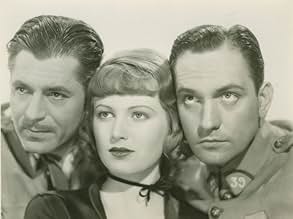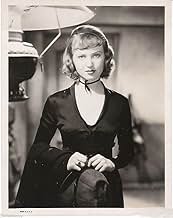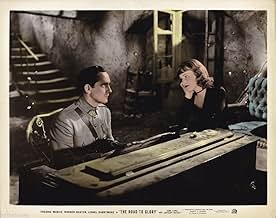VALUTAZIONE IMDb
6,9/10
659
LA TUA VALUTAZIONE
Aggiungi una trama nella tua linguaThe story of trench life during World War I through the lives of a French regiment. As men are killed and replaced jaunty Lt. Denet becomes more and more somber. His rival for the affection ... Leggi tuttoThe story of trench life during World War I through the lives of a French regiment. As men are killed and replaced jaunty Lt. Denet becomes more and more somber. His rival for the affection of nurse Monique is Capt. La Roche.The story of trench life during World War I through the lives of a French regiment. As men are killed and replaced jaunty Lt. Denet becomes more and more somber. His rival for the affection of nurse Monique is Capt. La Roche.
- Regia
- Sceneggiatura
- Star
- Premi
- 3 vittorie totali
Raymond Aimos
- French Soldier
- (filmato d'archivio)
- (non citato nei titoli originali)
Antonin Artaud
- French Soldier
- (filmato d'archivio)
- (non citato nei titoli originali)
Recensioni in evidenza
This story is set during the trench warfare of World War 1. Captain Laroche (Warner Baxter) leads his troops in various sorties to the front line. On average, half of the platoon doesn't make it back. Lieutenant Denet (Fredric March) joins his platoon along with Private Morin (Lionel Barrymore). When not in the front line, both Denet and La Roche are in love with the same woman - Monique (June Lang). However, the war goes on....
This is a good film if a little depressing at times. I enjoyed the first half of the film more than the second half. There are good scenes, eg, the whole section when the troops are sent on duty for the first time - the man on the wire, the Germans digging underneath the trenches to plant explosives, the relief when their replacements arrive, and the moment when a relief soldier asks what it's like and is given the reply "you'll find out" - a few moments later when the troops are clear of danger, we have a very poignant moment. The film then involves itself in the love interest before returning to the action.
The acting from Warner Baxter and Fredric March is better than June Lang and Lionel Barrymore. In fact, Barrymore is quite annoying. No way would he have been allowed to join the soldiers let alone volunteer on a vital mission. I couldn't really feel any sympathy for him. Just like I cant feel any sympathy for do-gooder numbskulls who visit war-zones in the name of charity/aid, get captured and then get be-headed.
There is a dramatic twist at the end regarding the love triangle between Baxter, March and Lang, and, despite heroics, the overall effect of the film is downbeat.
This is a good film if a little depressing at times. I enjoyed the first half of the film more than the second half. There are good scenes, eg, the whole section when the troops are sent on duty for the first time - the man on the wire, the Germans digging underneath the trenches to plant explosives, the relief when their replacements arrive, and the moment when a relief soldier asks what it's like and is given the reply "you'll find out" - a few moments later when the troops are clear of danger, we have a very poignant moment. The film then involves itself in the love interest before returning to the action.
The acting from Warner Baxter and Fredric March is better than June Lang and Lionel Barrymore. In fact, Barrymore is quite annoying. No way would he have been allowed to join the soldiers let alone volunteer on a vital mission. I couldn't really feel any sympathy for him. Just like I cant feel any sympathy for do-gooder numbskulls who visit war-zones in the name of charity/aid, get captured and then get be-headed.
There is a dramatic twist at the end regarding the love triangle between Baxter, March and Lang, and, despite heroics, the overall effect of the film is downbeat.
Howard Hawks reused the title of his1926 movie. This one owes some debt to Raymond Bernard's LES CROIX DE BOIS, particularly in the art decoration of the battlefield scenes. Yet the story itself is not anti-war. It recounts the growing professionalism and disillusionment of of Fredric March under the tutelage of his captain, Warner Baxter, in the ruined landscape of the Great War. In the end, all he has left is his profession, as he addresses the latest batch of soldiers, tells them of the unit's glorious history, and takes a drink.
It's clearly an A movie, with a cast that includes Gregory Ratoff, John Qualen, and Lionel Barrymore borrowed from MGM to play Baxter's father and private soldier in the regiment. June Lang plays the inevitable love interest and she's pretty shaky: visually excellent, good in some line readings, poor in others. That's probably Hawks' responsibility; he was fine with strong actresses, bit so much with lesser ones. I suspect he lacked the patience.
It's a war movie, so the big battlefield scene is important, and it's beautiful shot and edited. It was also noisy, and appropriately so, second only to ALL QUIET ON THE WESTERN FRONT for its shrieking chaos. It' a good movie, but not a great one; in the end it's too conventional, willing to admit that war is bad, but well, we're going into battle tonight, so let's get on with it. Hawks had not quite reached the point where he could make the movies he wanted. In the meantime, he was a professional, doing the job he was assigned as well as he could, even if it made little sense.
It's clearly an A movie, with a cast that includes Gregory Ratoff, John Qualen, and Lionel Barrymore borrowed from MGM to play Baxter's father and private soldier in the regiment. June Lang plays the inevitable love interest and she's pretty shaky: visually excellent, good in some line readings, poor in others. That's probably Hawks' responsibility; he was fine with strong actresses, bit so much with lesser ones. I suspect he lacked the patience.
It's a war movie, so the big battlefield scene is important, and it's beautiful shot and edited. It was also noisy, and appropriately so, second only to ALL QUIET ON THE WESTERN FRONT for its shrieking chaos. It' a good movie, but not a great one; in the end it's too conventional, willing to admit that war is bad, but well, we're going into battle tonight, so let's get on with it. Hawks had not quite reached the point where he could make the movies he wanted. In the meantime, he was a professional, doing the job he was assigned as well as he could, even if it made little sense.
The horrors of trench warfare in WWI are effectively shown in this anti-war drama, in which there were two scenes that stuck with me for hours afterwards. In one, the mournful wails and moans of an injured soldier stuck on barbed wire 100 feet from the trench had dead would-be rescuers strewn about him. The enemy snipers purposely let him live to tempt his fellow soldiers to a rescue so they could kill them. In the other scene, soldiers in a bunker hear the enemy below them and realize they are digging into the area to place explosives to blow it up, and this sets off a panic. Director Howard Hawks paces the film well and has exceptionally good action scenes. There's also a love triangle between Capt. Warner Baxter and his subordinate, Lt. Fredric March (both excellent in their roles) for lovely June Lang, which was an essential part of the plot. I enjoyed the humor provided by Gregory Ratoff and seeing Lionel Barrymore in one of his last films he made without a wheelchair.
First time I watched this movie and I give it eight stars, it's a descent movie, worth watching. Warner Baxter is known for his Dr. Ordway series which I enjoyed. This is a serious drama about front line war in WW1, the French fighting the Germans. The love interest of the two leading men (June Lang) was quite attractive. The reason I didn't give a higher rating is that it moves a bit slow at first but the war authenticity is impressive, even by today standards. Unlike the other reviews I'm not describing details, seems that spoils it for those who read the reviews before watching the film.
During the late 1920s-1930s, something unusual happened in Hollywood as well as Europe...films began to be released which depicted war as hellish. And, in these dramas set during WWI, there was a strong sense that the war was stupid and wasteful. Realistic? Absolutely...but far from the super-heroic look many later war films depicted.
"The Road to Glory" is about an outfit of French soldiers who are constantly given the roughest missions. Its leader, Captain LaRoche (Warner Baxter) seems tough and indifferent to his men's suffering...a brave front he puts on to deal with the impossible orders he's given. A new officer, Lt. Denet (Frederic March) is assigned to the unit. The film depicts both the suffering of the men as well as the woman that LaRoche and Denet both want.
The acting is very good in this one, which isn't surprising since March and Baxter are among the best (and most underrated) actors of the era. They're also helped along by many character actors who play various soldiers. Overall, with a gritty story and wonderful acting, this film is worth seeing....though I must warn you it's very depressing...which, if you think about it, it should be!
"The Road to Glory" is about an outfit of French soldiers who are constantly given the roughest missions. Its leader, Captain LaRoche (Warner Baxter) seems tough and indifferent to his men's suffering...a brave front he puts on to deal with the impossible orders he's given. A new officer, Lt. Denet (Frederic March) is assigned to the unit. The film depicts both the suffering of the men as well as the woman that LaRoche and Denet both want.
The acting is very good in this one, which isn't surprising since March and Baxter are among the best (and most underrated) actors of the era. They're also helped along by many character actors who play various soldiers. Overall, with a gritty story and wonderful acting, this film is worth seeing....though I must warn you it's very depressing...which, if you think about it, it should be!
Lo sapevi?
- QuizJune Lang was 19 at the time the film was released. She was twenty years younger the Fredric March and twenty-nine years younger than Warner Baxter.
- BlooperThe story takes place in World War One, but all of June Lang's clothes fashions and hairstyles, are strictly up-to-the minute 1936.
- ConnessioniEdited from Les croix de bois (1932)
- Colonne sonoreLa Marseillaise
(uncredited)
Music by Claude Joseph Rouget de Lisle (1792)
Theme music and also Played in the score and whistled often by Gregory Ratoff
I più visti
Accedi per valutare e creare un elenco di titoli salvati per ottenere consigli personalizzati
Dettagli
- Tempo di esecuzione1 ora 43 minuti
- Colore
- Proporzioni
- 1.37 : 1
Contribuisci a questa pagina
Suggerisci una modifica o aggiungi i contenuti mancanti

Divario superiore
By what name was Le vie della gloria (1936) officially released in Canada in English?
Rispondi

































